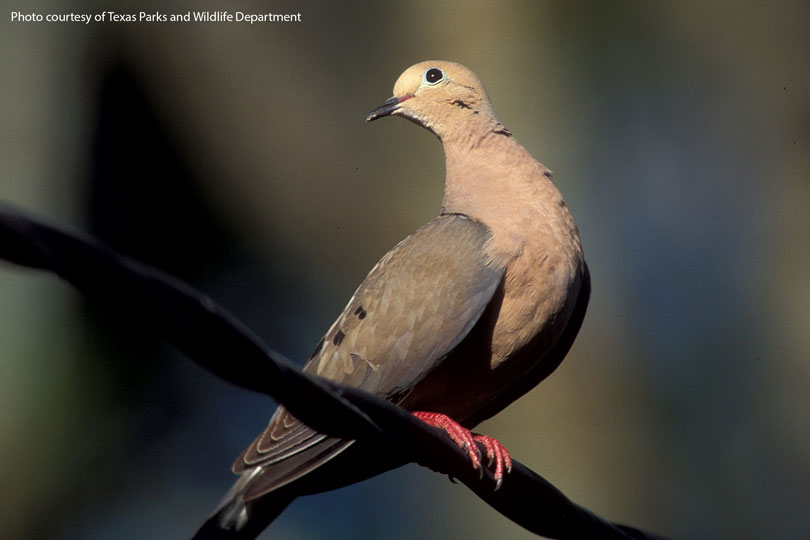By Jessica Domel
Multimedia Reporter
Despite the drought’s grip on most of the state, hunters should have plenty of opportunities to bag doves when the season opens in September.
“Initial numbers are on par with what we’ve seen for the past three or four years, which is a little bit below the long-term average. There’s still a lot of birds,” Owen Fitzsimmons, webless migratory game bird program leader for the Texas Parks and Wildlife Department, said.
The big difference between this year and last, according to Fitzsimmons, is the drought.
“A year ago, less than 10% of the state was in any drought. Now, we’re looking at almost 100% in drought. There’s something like 60% of the state in what we would term extreme or exceptional drought,” Fitzsimmons said. “This year, water is going to be key. Birds are going to be a lot more concentrated and a lot easier to hunt, I think. Key in on those water holes, and you’ll have plenty of birds coming in.”
There are many areas across the state where dove hunting is typically good.
“Some of the historic high harvest areas are near Throckmorton, Uvalde, Hondo, South Texas and the Rio Grande Valley. It’s no different this year,” Fitzsimmons said in an interview with the Texas Farm Bureau Radio Network. “I think chances are good pretty much across the state.”
Over the past few decades, white-winged doves have expanded their territory and population.
“Their numbers were going up and up, and I think over the past seven or eight years, they’ve kind of leveled off,” Fitzsimmons said. “Maybe we’re hitting carrying capacity.”
At the national level, there has been a slow decline in mourning dove numbers since the 1960s or ’70s, which Fitzsimmons said is likely due to urbanization and development.
“We’re not seeing any major declines in Texas,” Fitzsimmons said. “Numbers have been a little bit lower than the long-term average the past few years, but we’re still looking at a very healthy population of doves.”
This year, like any other, scouting before a hunt will be important.
“Scouting is always a good idea,” Fitzsimmons said. “Just because you have a field that may have been good last year, it might not be good this year. They can fly a long way to find food and water.”
Hunters should also consider the heat and possible supply shortages before dove season opens.
“We’ve had some shortages of ammunition the past couple of years, so get your ammunition ahead of time is what I would suggest. Don’t try to get it the day before when you go to your local sporting goods store,” Fitzsimmons said. “It is really, really hot and dry. So, if you do take your dog out, please be sure to bring plenty of water and shade for your dog and yourself. Heat can be really dangerous, and there’s no better way to ruin a dove outing than for someone to get heat stroke. So, be really careful and be mindful of that heat.”
Hunters should also be mindful of the risk of highly pathogenic avian influenza (HPAI) in wild birds.
“Doves and pigeons are not really susceptible to avian influenza, so we’re not really too concerned, especially now in the heat of summer,” Fitzsimmons said. “The influenza seems to not like the really hot weather and doesn’t spread as much. So, we’re not too concerned at this point.”
Hunters who shoot or find a sick- looking bird should still take precautions.
“If you do find a bird that seems really emaciated or sick, just to be on the safe side, even though it’s a very, very slim chance it is influenza, and there’s a very slim chance you could catch it, make sure to protect yourself,” Fitzsimmons said. “Wash your hands really well, wear gloves, put it in a Ziploc bag if you’re going to hold it for your local biologist, and just take the most precautions you can to be on the safe side.”
The first case of HPAI in a wild bird in Texas was reported in May. An owl at a rehabilitation facility tested positive for the virus.
HPAI is highly contagious. It transmits easily among wild and domestic birds. Symptoms include: diarrhea, incoordination, lethargy, coughing and sneezing and sudden death. Not all infected birds show outward signs of illness.
The regular dove hunting season for the north and central zones opens Sept. 1. The special white-winged dove days will be Sept. 2-4 and Sept. 9-11. The regular dove season in the south zone opens Sept. 14.
For more information, visit tpwd.texas.gov.

